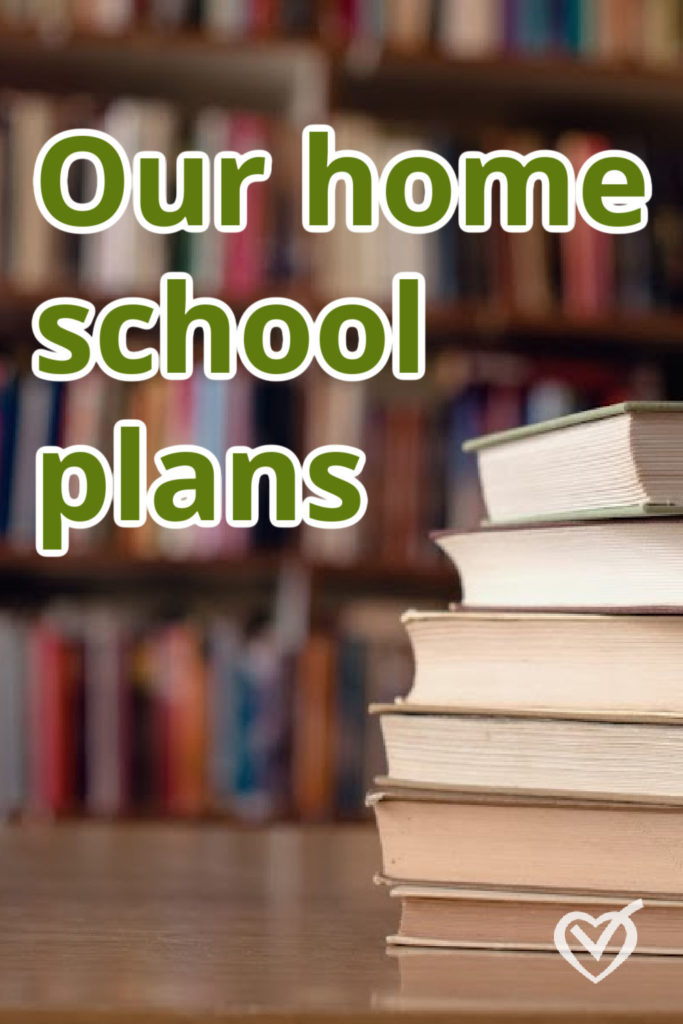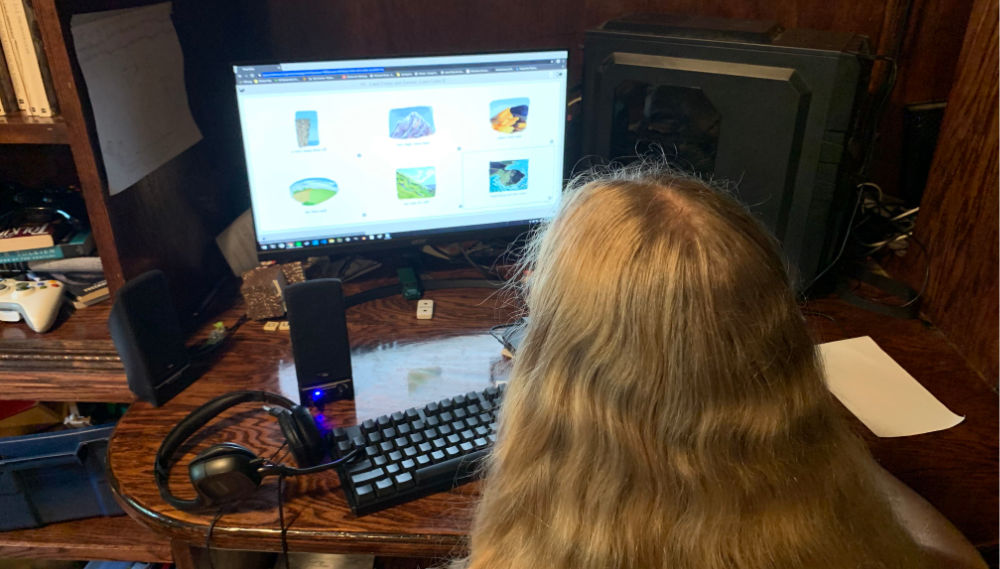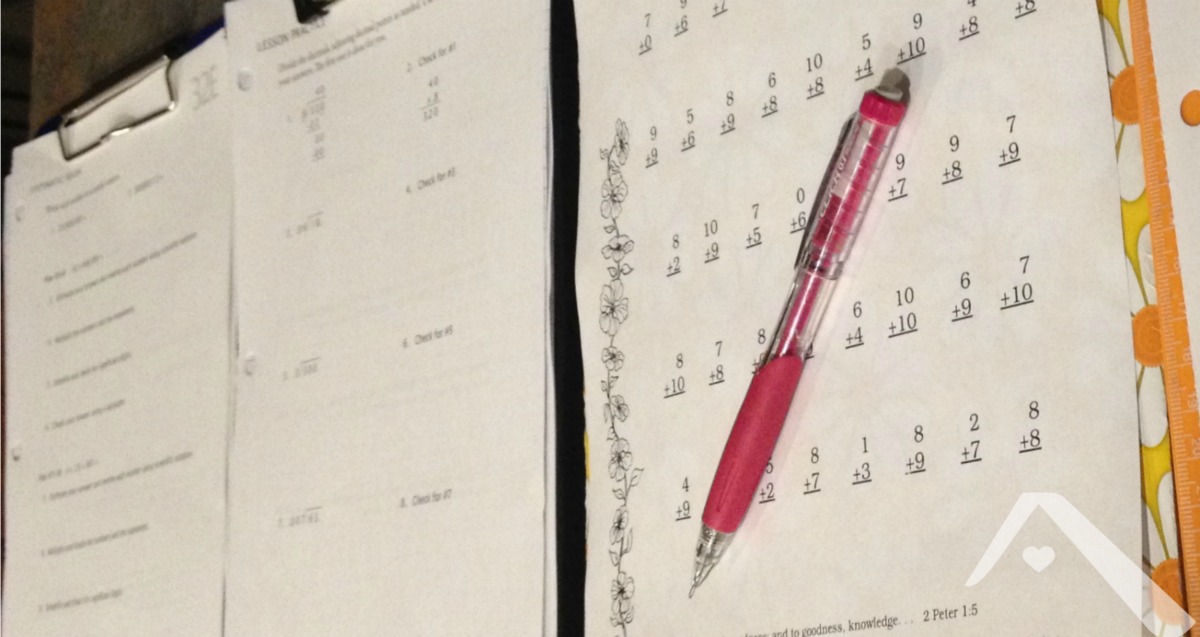All my procrastination this year has been rewarded except in one instance: school planning. Turns out that still had to happen because our school year was not affected by COVID-19. We’re just continuing to do our thing. As usual our school year began the first Monday after the 4th of July.
This year I will have a 10th grade boy, 7th grade girl, 6th grade boy, and 3rd grade girl – or so. My oldest will be a senior, completing his second and final year at the local community college. It will be my second son’s last year in my homeschool, too. The 2021-2022 school year will be strange indeed with the oldest gone and only three students at home during the day – assuming leaving the house will be allowed then.
The good and bad thing about homeschooling over the long haul and having grades on repeat is that I didn’t have to do very much research or book buying. The bulk of the decisions to be made were merely about how to arrange the various pieces of the plan throughout the week so they are doable.

I think we’ve done that, so I’ll share my plans and books for this year!
Morning Time Plans
For the most part, we’ll just be continuing to do our usual Morning Time routine.
At about 8:30am, I blast Andrew Peterson’s Little Boy Heart Alive, our 4-minute warning and call to the living room with your Bible and psalter.
This year, our agenda goes:
- Sing a hymn (using a short loop of our family’s top 20 – memorization comes through repetition)
- I read a section from Psalm 119 and then we each pray, going around the living room.
- We read the Proverbs chapter that corresponds to the date, each reading a verse, going around the living room until the chapter is complete.
- We turn to and recite a Lord’s Day section from the Heidelberg Catechism. I have a loop of about 17 Lord’s Days we’ve memorized that we just repeat.
- We sing a Psalm from the Psalter from my loop of about 30ish Psalms we know and commonly sing in church.
- I have a loop of Psalms and passages that have been memory work for the older two boys. Now my middle two read one. MWF, Ilse reads one of the Psalms and TR Knox reads a Psalm. The other reads that day’s passage.
- Then Geneva reads her Scripture selection. I have a short loop of 10 Scripture passages for her to read on repeat to memorize over time.
- I asked Jaeger to pick what he would like to memorize this year, and he has chosen a different epistle each term. He started with Colossians and this term is doing Philippians. He reads one chapter each day, looping back to chapter 1 after the final chapter.
- We listen to 2 poems from 81 Famous Poems via Audible (see below).
- Finally, we close with a hymn from my long list loop of hymns we know.
- I say, “And all God’s people said!” And they say “Amen!” And then they scramble up and move on with their school day.
In the past we’ve chosen and read aloud a poem each, and we did that during summer term, but to both shorten Morning Time for the benefit of 3 of the children’s school days and to broaden their exposure to poetry beyond what they would pick, we are listening to 2 poems a day using The Best Poems of All Time, volume 1. First we’ll listen again to the one we listened to the day before, and then listen to a new one (twice preferably, but we’ll see how it goes).
You can read more about Morning Time, our history with it, and our lists here.
Tenth Grade Plans
The biggest change for my son this year will be that I will be working with him on time and task management instead of giving him a weekly checklist with everything plotted out and assigned day by day. To be ready for college work next year, he needs some practice plotting out when to get his work done on time – and then following through. My oldest was a natural with that, but my second son would much rather just be given a list with clear break downs and do it than take care of that administrative angle himself.
So that will mean we’ll have some challenges there and I will need to be on top of checking in and holding accountable. I will give him his assignments for the week, and he has a whiteboard by his desk that he’ll use for making his plans. It will most certainly go through many iterations along the way, because that’s how you learn.
Tenth Grade Math
In math, we’re sticking with Math-U-See. He finished up Geometry during the summer term and has just started Algebra 2.
By the end of last school year, it seemed he was still sometimes struggling with algebraic concepts, so at the beginning of our summer break, I bought him Learn Math Fast, the algebra volumes. He worked on that over the summer on his own and said it did help.
He’s motivated to make progress in math because he wants to test into college math in the spring. Motivation definitely helps!
Tenth Grade Bible & Theology
Last year I used the Bible Reading Challenge to make daily assignments for Bible reading, but the school year ended with 2 1/2 months or so left on the schedule. So I’ll pick up where that left off for the summer term, then hand off his own Bible Reading Challenge checklist to manage when the new one comes out for September.
Last year we also read half of Calvin’s Institutes of the Christian Religion and so this year we will complete the second half. We read about 20 pages or so per week and meet with friends doing the same readings to discuss during Coffee & Calvin every other week. He keeps notes and a commonplace with that, but I don’t have to specify that anymore because he’s picking up those habits of a reader and making it his own (meaning, he’s doing it, but not my way, so it’s best for me not to get involved).
Tenth Grade Science
This year is Physics – with lots of reading, some drawing, a little math, and no experiments. This is science I can administer. Lab sciences are delegated to the community college in junior and senior year. My focus is on giving the broad scope of scientific ideas and concepts.
The reading schedule is basically the same as what I used with Hans two years ago.
Tenth Grade History
History is simply part 2 of what was begun last year. He and his friend are continuing with the second half of Old Western Culture: Modern, Modernity with Dave Raymond, and A History of the American People by Paul Johnson. They do the readings for OWC & Modernity, plus read Johnson’s history book, then meet on Tuesdays and Thursdays to watch the video lessons streamed from Roman Road, then they take a walk together and talk about it.
Old Western Culture is part history, but also cultural history and literature, so I’m checking that box with this line-up also. However, he’s also picking 1-3 books per term to read from the 1000 Good Books list. He’s a reader, so that’s no big deal.
Tenth Grade Thinking & Writing
In the fall, we will start a logic & rhetoric section in our schedule, also with his friend. We’ll use the Liberty of Logic and accompanying book, though I’m waiting until the class is over and I’ve watched the material to decide how to use it with them.
Writing can only be as good as your thinking. So working with logic and constructive thinking practice through Socratic discussion will be a part of our rhetoric time. Logic does not need to be a subject “completed” before moving on to rhetoric. None of the liberal arts are ever areas we complete and move on from. They are areas of knowledge we are always expanding and they are tools and ways of knowing we are always using to gain knowledge in any area.
I say rhetoric, but though I was tempted to use Fitting Words as an actual rhetoric curriculum, I sighed, set it aside for the next set of kids, and made the best choice for the boys in front of me. We’re doing essay writing, not classical rhetoric. We will, however, learn how to be persuasive and skillful in writing and speaking, which is rhetoric more broadly conceived.
My primary text will be the slim paperback The Lively Art of Writing. I’ve used this to teach a high school writing class before, but not yet with my own kids. I’m looking forward to it, because I remember enjoying the book. I will also have them read and do some exercises from Jacques Barzun’s Simple and Direct and from The Rhetoric Companion by the Wilsons.
I’ll have them write one essay per term (5), plus we’ll have various exercises interspersed as well.
Tenth Grade Economics
Yes, when you’re starting down the last year of homeschooling your teen, your mind immediately jumps to “What have we missed??”
Economics, I believe, is an important and timely concept to understand before stepping out into the world right now, and not only for personal responsibility (that too). The economy is the driving force of our society (for worse, not for better), and yet most people misunderstand or are plain ignorant about how people and money and markets work. These are important concepts to encounter, and I it’s not going to happen in a non-ideological framework at any university and not with truth and reality as a primary concern in any mainstream conversation.
My oldest also did an Economics study, so this plan is mostly recycled. However, Dave Ramsey’s site had a big sale on their digital Financial Peace course for teens at the start of COVID that I jumped on and added to his agenda.
My tenth grader is very independent in his work. I check in to make sure things are actually happening, I give him the checklist with work to be done, and I read and give feedback on his notes and narrations (1 or 2 a day). When you have good books and teens who are interested and motivated, homeschooling high school is an awesome thing. If you have a twelve or thirteen year old now and that sentence makes you think this isn’t going to work for you – don’t give up! Hold tight and hold firm. Those are like the years the caterpillar has turned to soup and looks hopeless, right before emerging as a full-grown butterfly.
For the record, I did not call my fifteen-year-old son a butterfly.
For more on our various high school plans over the years, see this post: Homeschooling High School
Seventh Grade Plans
So, speaking of twelve-year-olds – I have one of those, too. It’s also my first twelve-year-old girl, so I still have a steep learning curve, even though I’ve done twelve and seventh grade twice before.
She’s a different student with different needs and style, so her plan is not just my previous seventh grade plan, cut and pasted.

Math
Math-U-See all the way, still and again. She’s halfway through Pre-algebra and I have both the Algebra 1 and Geometry books waiting in the wings for her.
We also use Khan Academy if we need to review a concept or need something explained a different way.
Bible & Theology
Over the course of the next two years, she will work through Starr Meade’s The Most Important Thing You’ll Ever Study series (called MIT-YES at our house). This series gives historical and theological background as you read through the Bible chronologically.
Both my older boys did the same series and it was what they would “forget” to do or do poorly unless I checked in regularly on their work. After the readings, it has fill-in-the-blank and short answer questions, which they despised. My daughter, however, loves it and works ahead. Go figure.
Latin
Last year we switched to Visual Latin and loved it. We’ll pick up just a lesson or two behind where we left off and continue with the program. My plan is to take the 2-volume series and spread it out over 3 years. Last year we did a lesson a week (not every week, though), but much of the early lessons were review. Now we’re going to slow it down and do a single lesson over two weeks, with more deliberation and less speed (and error, hopefully) with the translation exercises. There are too many on the B worksheet to do well in one sitting, so we’ll spread that out over three days.
My goal is also not just to check that it was done, but actually correct the work (go figure) this year, and then spend time before they continue on going over their mistakes so they don’t translate 20 sentences all in a row, cementing the mistakes by their practice.
So the flow will go:
- Monday 1: Watch the A video, use the sheet to narrate the new concept from the lesson. If there’s vocab or a chart, copy it into Latin notebook.
- Tuesday 1: Watch the B video, do 3-5 sentences together.
- Wednesday 1: Do 5-8 sentences on their own.
- Thursday 1: Go over W’s sentences, do 3-5 more.
- Friday 1: Watch the C video, copy the new vocab from the chart into Latin notebook.
- Monday 2: Finish worksheet B.
- Tuesday 2: Do worksheet C.
- Wednesday 2: Complete the quiz.
- Thursday 2: Go back and work a few sentences from previous lessons, parsing above each word.
- Friday 2: Correct worksheet C & Quiz
In addition to Visual Latin, they are doing Picta Dicta Ancient World 3 times a week for 10-15 minutes and Natural World twice a week.
History
Seventh grade has been when I change up the history and science for my students. They leave Elementary Lessons and begin their own thing.
The dynamics and needs of the next set of kids though is quite different and so the plan needs to be adjusted accordingly.
Last year we did a little composition instruction, and this year my writing students, Ilse included, just need practice. So I am assigning history reading, 2 chapters per week, and requiring them to do a single paragraph written narration for each chapter.
So I am assigning The Landmark History of the American People. It has short chapters, some illustrations, and engaging prose.
My 10-year-old will also be doing the same history, as will 3 others from 2 different families. Every other Friday we’ll get together and add to our books of centuries and review the timeline song (just for fun).
Science
I have always done the history of science in seventh grade, and I like the approach although I did not like the textbook option I used with my older two boys. I did some more digging and reviewing this summer and found a better replacement: A Little History of Science by Willian Bynum. It is written for adults, but its short chapters have very plain and concrete language with wry humor. As with the history book, both my middle-grade students read a chapter and write a paragraph narration for it each week.
Every other week we get together with a few friends who are following the same reading schedule and watching a YouTube video or two on a science topic that came up in the readings.
Elementary Lessons
Twice a week we are still getting together – in person! – with a few friends (5 kids from 2 families plus my younger 3) to learn together.
During this time, we’re doing Word of the Week, Shakespeare, artist study, and Halliburton for geography.
For Word of the Week on Tuesdays I introduce the word, we talk about its part of speech, its definition, and read a little excerpt about the word from vocabulary.com. They write the word and its definition on and index card which they must bring back on Thursday with a sentence that uses it well (not “He is __”). They share their sentences aloud in class Thursday. On the sixth week we’ll use those sentences to review grammar concepts.
The point of the Word of the Week is less about growing their vocabulary, which I believe is best done within the context of wide and varied reading and listening, and more about becoming the sorts of people who love words and enjoy playing with them.
For Shakespeare this year we’re starting off with The Tempest, and then will do Hamlet, then Merry Wives of Windsor. I am still using my 5 step Shakespeare plans and same memory pages. In class this last week we watched portions of this highly ridiculous and tacky version of the Tempest featuring Richard Burton.
We do a low-key, not-Charlotte-Mason-approved artist study. We take one term per artist and one piece from that artist per week to study and narrate in various ways. Once or twice per term we’ll also watch a SmartHistory video on the artist or painting we’re looking at. This year I picked artists based on what Rebecca at A Humble Place had available for purchase. Instead of finding, downloading, and printing bad quality options, I bought Rebecca’s packages. We’re starting with Titian, which is a free plan, and I sent the pdf files to be printed at The FedEx Store; they turned out really nice.
We’re in our second year reading Halliburton’s Book of Marvels, one chapter per week. The first day I read the chapter aloud while the kids pass around the iPad with a picture of the place pulled up on it. The second day we watch a YouTube tour video and talk about where it is on our world map.
Poetry, Plutarch, & Pedantry
Ironically in the year of COVID, my middle kids get more class time with friends than ever.
On Wednesdays we’re doing a 90-minute class using Grammar of Poetry, The Lawgivers, and Art of Argument supplemented with Liberty of Logic.
Grammar of Poetry is about how poetry works. They’ll learn how to scan poems, how to identify meter and rhyme schemes, how to recognize and use tropes, as well as how to better appreciate poetry for what it is and for how difficult it is to do well. We’ll use the video lessons in class and do most of the assignments orally in class, with some homework that will still be checked as a part of group discussion in class – so I don’t have to grade anything.
The Lawgivers is a new translation of a set of Plutarch’s parallel lives done by David Hicks and published by CiRCE. I’m reading it aloud, pausing at each section break for a randomly-selected narration (with a dice roll – I have a conveniently sized class of 6). They also get an index card during the reading to sketch what they hear or take notes. Some of what we learn here will also provide material to be discussed while we study logic!
The primary text I’m using for logic with this set of 5th-7th graders is Classical Academic Press’ Art of Argument, on informal logic of fallacy detection. But what good is identifying bad arguments if you can’t make a good argument? So I’ll be supplementing the workbook with class-time teaching from The Liberty of Logic by Steven Rummelsburg and Material Logic by Thaddeus Kozinski, currently available from Schole Sisters. In no way will we cover all of the course material or even all of the chapters of the Material Logic book. However, having taken it as teacher training for my own ability to think and reason about topics, I am going to practice guiding the students through dialectical reasoning. As far as content, I am going to focus on the Three Acts of the Mind and Three Kinds of Goods, using them as a framework for asking questions to come to better understanding.
Other Things
I believe school work should only take the first part of the day so the second is left for living a full, interesting life. Ilse also plays piano (with lessons), sews (with the help of YouTube), crafts creatively, plays outside, has friends, loves toddlers, listens to audiobooks while weaving tiny colored rubberbands, and is a cheerful, voluntary help around the house.
Plans for my ten-year-old
For the most part, my ten-year-old is doing the same program as the twelve-year-old. The only difference is, of course, individualized math progress, and also a different Bible curriculum.
He is doing Latin; Elementary Lessons; Poetry, Plutarch, & Pedantry; and the same history and science readings and assignments as his older sister.
Bible
Knox is reading and learning about the New Testament this year using Covenantal Catechism volumes 4 & 5.
I absolutely love the written lessons in these volumes, although we don’t do any of the added material like the catechism questions, singing, or review questions. The teaching in the lessons themselves is spot on, approachable, and made me fall in love again with the basics of theology the first time I taught it. I’ve taught it at least 3 times now, but this year I’m simply assigning it.
We’re taking 2 days to do one lesson, doing the subject 4 days a week. Every 5-6 weeks we take a week for review. The pattern goes:
- Day 1: Read the passage from Scripture & do a written narration
- Day 2: Read the lesson & do a written narration
Volume 4 in this set is on the gospels, with an emphasis on how Jesus fulfills the roles of prophet, priest, and king. Volume 5 teaches about Acts and how the gospel advances from Galilee, into Judaea, unto the uttermost parts of the earth.
Other Studies
My ten year old is also, like the other children, in piano lessons.
He’s learning to type with Typing Club, a free online tutorial – but we have to strictly regulate how much time he can spend on typing (no more than 10 minutes a day), because he has been known to spend over an hour on typing, believing that he is doing his schoolwork all the while.
Plans for my nearly-eight-year-old
My youngest will be eight in November, so if we were in school, she’d be in second grade. But grades aren’t actually real things. They’re made up categories that allow education to scale to an industrial level.
She’s reading chapter books and can read Psalms aloud fluently. She’s doing multiplication in Math-U-See. She’s a smart cookie. Her best friend with whom she’ll be sharing lessons is 9 months older and thus in “third grade.” I might as well call it third grade.
Plus, she’s the youngest. As an oldest myself, I see the tendency for youngests to be coddled. When my oldest was 7 1/2, he was so old and helpful and mature. My youngest seems so young and she’s not my first pick for a go-to helper. The difference is only in my perception, though, not their relative abilities. I saw my first 7-year-old next to a 5-year-old, 3-year-old, and baby. I needed an extra set of hands and his were quick and willing. It was awesome. I see my current 7-year-old next to 10, 12, 15, and 17-year-olds; her help is not as essential to my situation and her abilities aren’t relatively impressive.
That just means I need to be more intentional with bringing her along as a helper, giving her meaningful work, and holding her accountable.
All that to say, I’m thinking of the work level she’ll be given as third grade because she’s capable and I need to treat her as capable so she can increase her capabilities and become more responsible.
Math
You guessed it: Math-U-See. Plus she’s using xtramath.org for math fact drills.
Bible & Theology
My daughter is also using Covenantal Catechism, but she’s doing volumes 2 & 3, an Old Testament survey.
She follows the same pattern of doing the subject four days a week, with each lesson taking 2 days to work through.
This is her first foray into independent work, and she’s doing very well with it. Normally I wouldn’t give a 7-year-old independent work, but she wanted some and I knew it was more likely that she would do her assignments than that I would do it with her consistently.
For each lesson she will read the assigned Scripture and narrate, then the next day she will read the lesson from Covenantal Catechism and narrate. Because some of the lessons are on a large chunk of the Old Testament, she has a mix of actual Scripture and Vos Story Bible assigned as her first day’s reading.
Her checklist says she is to narrate each reading, and she has three options to choose from:
- Written narration (which I added because she asked for it – she wants her Word processor time like the other kids)
- Recorded oral narration using voxer (she sends me a message with her narration so she can do it after her reading no matter what I’m doing)
- Draw a picture and copy a sentence (she has yet to pick this one, interestingly).
Science
While I am teaching the middle kids on Wednesday and the bigger kids on Tuesdays & Thursdays, my friend is reading science and history with the youngest at her house down the street. Her kids walk to my house, my 8-year-old walks down to her house.
She is reading to them from a selection of All About science books. Right now they’re reading All About the Weather.
They’re probably narrating or drawing or something afterwards, but I don’t know for sure. We’ve divided and conquered and how they structure their time and what they do is up to my friend. We are both on the same page that the important thing in these years is that they realize the world is a fascinating place.
History
History is being covered at the same time and in the same way as science. My friend, Kirsti, reads to them from A Child’s First Book of American History, which is a Beautiful Feet Books edition.
She reads a chapter to them, and then they each add a notebook entry for the chapter (they do this for both science and history readings). It might be names, or sentences, or a picture that they add to their notebook, chatting about the reading or their thoughts about it while they do.
Elementary Lessons
Our youngest and then two more friends join us for Elementary Lessons on Tuesdays and Thursdays, too, for the whole shebang: Shakespeare, art, geography, and Word of the Week – sometimes a timeline song thrown in for good measure.
Grammar
In classical education circles, third grade would often be where you start to see grammar added to the curriculum.
Geneva is receiving a classical education, and this is what we’re doing for grammar this year:
- Memorizing poetry
- Reading a fairy tale anthology
- Studying artists’ masterpieces
- Reading and enjoying Shakespeare
- Reading and following with map work & video tours Halliburton’s world travels
- Copywork from good books & poems
- Learning about the world and people who have lived in it before us.
I believe these are the things that are truly classical grammar studies for our young children. To hear more on this thought, check out this Scholé Sisters episode on grammar in a classical education with Kevin Clark.
Up next: Dear Mom who wants to give her five-year-old a classical education
Or try this next: Our classical homeschool curriculum picks

HOMESCHOOL AUDIT
Make next year better based on how this year went.
Download the free homeschool audit and use this year’s experience to make next year better.







































I’d like to see what else you’re using for your 7th grader. Is there a “to be continued” for that? Thanks!
Oh yes! I’ll be finishing up this post this week with everything we’re using for everyone. :)
Where do you like to pick up your books. The Halliburton book especially seems so hard to find. And how do you coordinate all the times when you’re doing it alongside others? Or teaching it to the small group
I found it for under $20 on amazon. That was the price for each part though. But we only covered one book in a year.
It is so fun and interesting to read what you’re doing here! I love your history and science method. That is what I chose to do with my daughters science this year and let her drop the loads of time consuming workbook questions. I have loved reading what she has to write about.
Do you use anything specific for language skill for elementary and middle grades? How do you teach spelling, grammar, and writing for them?
Mystie, do you have plans that you would be willing share for your economics studies? And did you spread this out over a year or just do for a semester? Trying to figure this out for my current 9th grader. :)
Yes! Here’s a pdf version of the plan: https://www.dropbox.com/s/637zzvj4kfhmpwy/Economics.pdf?dl=0
Do you have a fuller review of the Novare science curriculum? It looks like you’ve used that for a few years. I’m considering switching to that for my middle schooler and using it through high school. You said no labs, so do you just use the text for reading assignments?